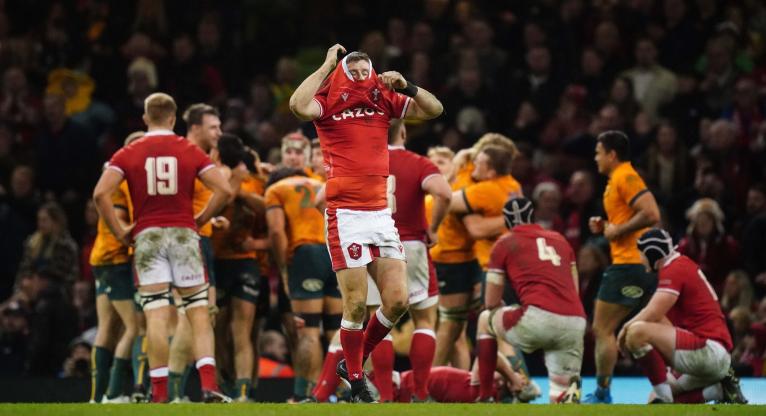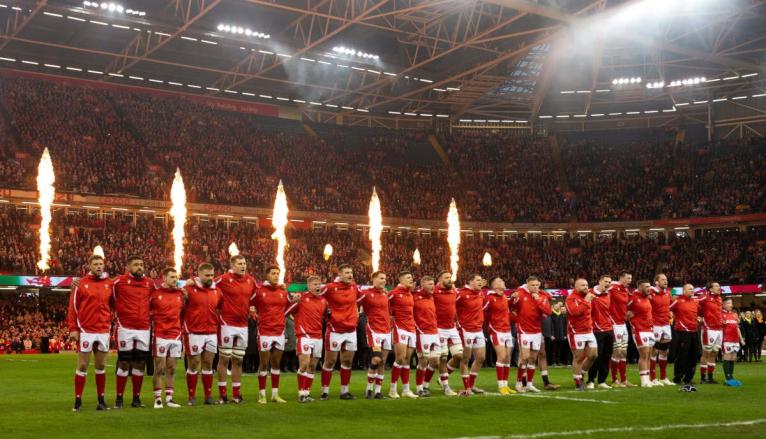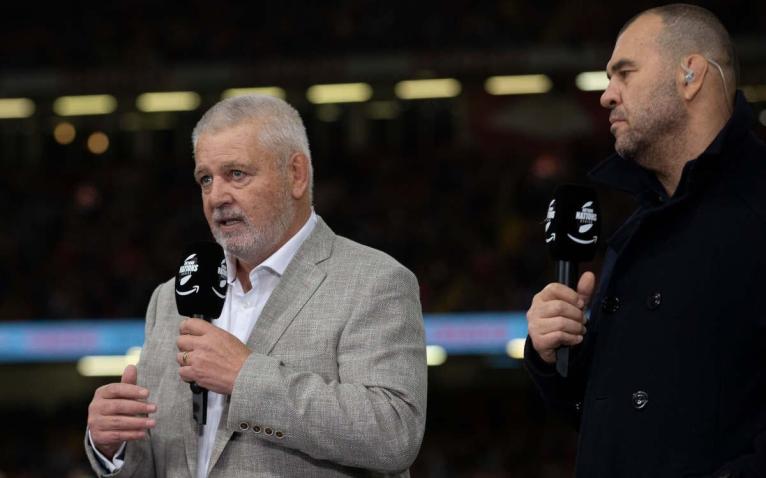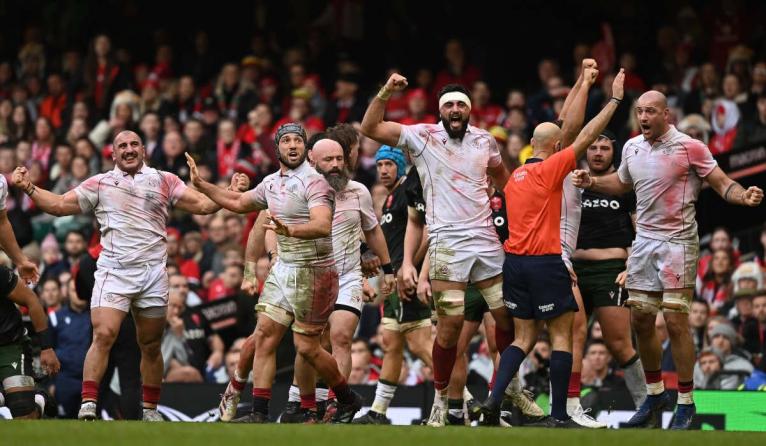Wayne Pivac’s tenure and the circus around it is growing ever more theatrical. What had edged into tragicomedy following the hapless defeat to Georgia descended into farce on Saturday, with Wales appearing to redefine the notion of an “unassailable lead”. And with the spectre of Warren Gatland waiting to swoop in and reclaim his old job, the Shakespearean tropes of envy, betrayal, and bubbling rage are all lurking beneath the surface.
As with any play exploring the human condition, the reality is more nuanced than the headlines suggest. Wayne Pivac is a decent, honourable man who’s found himself in the unpleasant situation of having his every move dissected and analysed by an increasingly restless Welsh rugby public. Whatever your thoughts on his coaching reign, and its apparent lack of progress, you’d have to be a cold-hearted brute not to empathise with his plight. Yes, he’s handsomely paid, and is tough enough to withstand the slings and arrows, but he’s also a bloke with a family and feelings, who’s having to defend his actions not just to his employers, but to a nation. Sport is so tied up to Welsh identity that a loss on the pitch strikes hard at the soul of a nation. After defeats against Georgia and Iran, this week was shaping up to be the worst in some time for Welsh sports fans. And it’s got worse.
Saturday’s capitulation to a patched-up Australian side felt like a defining moment. At 34-13 ahead, with 20 minutes to play, Wales were coasting over the horizon. The recalled veteran Alun Wyn Jones brought added steel and conviction, the Welsh scrum – pulverised against Georgia – became a powerful weapon, rucks were being cleared with brutal efficiency, and tries – so scarce all year – were raining down. In terms of the narrative, it signified something of a redemption arc. Yes, this was an exhausted, injury-ravaged Australian side playing their fifth test of an arduous tour, but Wales were absolutely dominating them, racking up a record score against a nation that had for so long been its nemesis.
Then, almost inconceivably, they lost.
The fizzing, bustling menace that was Mark Nawaqanitawase grabbed the game by the scruff of the neck, energised by the enthusiasm of the Aussie reinforcements, and in twenty excruciating minutes that will haunt Welsh fans for some time, delivered a miracle comeback.

It means Wayne Pivac’s calendar year reads played 12, lost nine. Two of these defeats came against Italy and Georgia in Cardiff. Sandwiched in between was an increasingly dreamlike first ever victory over South Africa on their own soil. That July night in Bloemfontein felt like an epochal moment in the trajectory of this Welsh team; the turning point that would see them surge towards the World Cup with confidence, brio and swagger. It was a false dawn. Whatever happens next, it will forever be etched on Pivac’s CV; as will a Six Nations Championship in his second season in charge, but so too will this latest run of ignominious defeats. It’s genuinely confounding. When Wales were poor in the Nineties, they were unremittingly poor. This sorry run has been punctuated with some giddy highs, but they’ve proven to be anomalies. I’ve said it before, but it bears repeating, no one does feast to famine like Wales.
And no one does insane psychodrama quite the same either. It appears an ingrained characteristic of the Welsh psyche that we’re rarely happy unless we have something to be unhappy about. International windows narrow the focus a little, and the amount of casual fans aiming their ire at the national side swells a thousand-fold, but we need to zoom out to examine the illness afflicting Welsh rugby as a whole. The underwhelming performances on the pitch may well be down to team preparation and selection – and the spotlight will naturally shine brightest on the coaches and the players – but they’re also undeniably a symptom of a wider malaise.
It’s patently absurd that a business with a £100m turnover can be held to ransom by grass-roots clubs.
Welsh rugby, as Sam Warburton has pointed out in recent weeks, is locked in an anachronistic system of governance that is dragging the game backwards at a time when other unions are making quantum leaps forwards. Ireland have refined their centralised system to such a degree that they are dominant at provincial and national level while Wales continues to bicker and fight over control, funding and virtually everything else. Welsh rugby is a union of more than 300 clubs, all of whom get to vote on issues that determine the sport’s future, regardless of their size, expertise or clout. Parochialism reigns. It’s patently absurd that a business with a £100m turnover can be held to ransom by grass-roots clubs. That’s not to say that there aren’t incredibly capable, diligent, and hard-working people at such clubs whose efforts help keep the community game afloat, but that arm of the game should be entirely separate from the professional arm which requires dynamic, modern solutions in an increasingly competitive sporting landscape.
The previous regime under Gareth Davies and Martyn Phillips tried its best to reform the system of governance, streamlining its board so that the majority no longer resided with the community game. They were voted down by, ahem, representatives of the community game. The most recent attempt at reform – the introduction of an independent chair, was also rejected after failing to meet the 75% majority threshold. It’s an infuriating Catch 22 that even Yossarian would struggle to overcome. It was this kind of stagnant quagmire that talented, respected businesspeople like Amanda Blanc sought to escape. Invited onto the Professional Rugby Board to inject some dynamism and outside expertise, the Aviva CEO – once recognised as one of Forbes World’s 100 most powerful women – ended up leaving because she “wasn’t being listened to.”

The WRU should be structured and run like any other business of its size, and the composition of the board needs to change so that reforms can be passed swiftly without having to persuade every last blazer-clad committee man in every last club in Wales. We’re in need of a speedboat, not a lumbering rusty oil tanker. The WRU’s website contains a strategy that was published in 2016 by the previous regime. Since then we’ve endured a global pandemic, and a crippling cost of living crisis, both of which have driven Welsh rugby further to the brink, yet the strategy hasn’t been updated or revised. Saddling the regions with an extra £20m worth of debt during this time is counter-productive. Given the importance of Welsh rugby to the economy, surely a solution can be found whereby that debt is written off or absorbed by the Welsh government or governing body, and the regions are given a clean slate to begin from. That’s not absolving the regions of responsibility. For the good of the game. everyone needs to step up and put self-interest aside.
The discord that continues to define the relationship between the WRU and the professional regions is paralyzing them. Unloved, uncompetitive, and unable to determine their budgets for next season.
The structural solution seems obvious: an independent chair, the Professional Game Board chair, the chair of the community board, the CEO, and four highly qualified independents bringing outside expertise to the table. Expertise from places like marketing, high performance, and finance and, preferably the inner sanctum of the Welsh changing room. I suggested to Sam Warburton on Saturday’s TV coverage that he should throw his hat in the ring for chairman. I was joking, but it makes perfect sense to have someone of with his unique knowledge and experience on the board. Intelligent, thoughtful ex-players should have a greater input. With someone like him in the mix, the WRU would go some way to shedding its current image as an organisation of faceless bureaucrats.
The discord that continues to define the relationship between the WRU and the professional regions is paralyzing them. Unloved, uncompetitive, and unable to determine their budgets for next season, they remain mired in mediocrity. Three of them are in the bottom half of the URC table. Cardiff are the outliers in the top half, and they served notice on Sunday that they’re capable of big victories with a stunning 35-0 shutout of the Sharks in Durban. But on Saturday, the Ospreys supplied 9 of the starting 15 to Wales, and they’ve only won once all season.
It doesn’t require a towering intellect to deduce that players inured to losing at club level can’t suddenly transform into winners at test level. Winning breeds confidence, and inculcates the ability to close out tight games. Against Australia, with Taulupe Faletau and Alun Wyn Jones both substituted on 70 minutes, Wales seemed unable to close ranks, put their foot on the ball and protect their substantial lead. Those left on the field had seemingly forgotten how to win.

Speaking of Alun Wyn Jones, his presence in the team may be a familiar comfort blanket to many, but it speaks volumes about the paucity of talent coming through. Welsh rugby used to be the envy of the world when it came to its rugby riches. That’s no longer the case. Ten of the 23 on Saturday were the wrong side of 30. Alun Wyn Jones was one of Wales’ best players on the day, but at 37 he can’t go on forever. Ken Owens and Rhys Priestland aren’t far behind him. All wonderful servants, but where is the next generation and why aren’t they hammering down the door?
Joe Hawkins looked slick assured on his debut, but he’d only started once for the Ospreys this season. What does it tell us about the supply lines if Wales are blooding a player that isn’t even a regular at his club? Compare that to a Stuart McCloskey in Ireland who’s been a stalwart for Ulster for a decade, but whose cap numbers remain in single figures because he happens to be competing against the likes of Garry Ringrose, Robbie Henshaw and Bundee Aki. Excellence breeds excellence and drives up standards. It’s difficult to imagine Ireland plucking a virtual unknown and thrusting them into the white-hot cauldron of test rugby.
If the WRU was to increase the funding, then it would naturally want more control, yet the regions want to remain fully autonomous. Something has to give.
For season after season, the Welsh Premiership has been trimmed, expanded, and tinkered with. It’s supposed to be the bridge between the amateur game and the professional game; a breeding ground for the next generation of regional stars to hone their craft and sharpen their tools, but it’s manifestly failing to fulfil that purpose. The WRU’s Performance Director, Nigel Walker, was adamant that it needed to be shrunk to a nine-team league, comprising two clubs per region, and a club in North Wales. This, so the argument went, would streamline the competition, concentrate the talent, and raise the overall standard. It was, predictably, vetoed and is now a bloated 14-team competition. Self-interest trumping progress once again.
So where next? The aforementioned stalemate between the WRU and the regions leaves us in a quandary. It’s a nuanced relationship that could fill a column in its own right, but it boils down to this: the regions want more money to be more competitive, but the WRU doesn’t trust them to spend it wisely. If the WRU was to increase the funding, then it would naturally want more control, yet the regions want to remain fully autonomous. Something has to give. In New Zealand, a country with a slightly bigger population than Wales, and a similar obsession with rugby, the five Super Rugby sides are centrally controlled. If the national coach wanted to pick a player in a different position, an agreement would be struck with the club to move that player.

In Wales we have a situation in which George North has been converted to outside centre for his country, yet continues to play on the wing for his club. And recently we had a scenario where the cash-strapped regions were bidding against one another for a returning international, forcing the price up beyond market value. Another act of avoidable self-harm.
Wayne Pivac’s fate may already have been sealed, but whether he stays or goes is just one act in this increasingly complex play. Warren Gatland is already being touted as his successor, a move that would arguably be more of a PR stunt than a genuine step forward. Gatland is a shrewd operator and will be wary of tainting his legacy as Wales’ most successful ever coach. He was irrefutably a brilliant operator, but he was also fortunate that his tenure coincided with a golden generation of players. He’ll be acutely aware that this current generation doesn’t possess the same sheen of potential world class. Even his midas touch could only go so far.
A former senior figure in Welsh rugby recently told me that Wayne Pivac was like a “Formula One driver without a team, out on the track up against other cars with great teams behind them. Then we wonder why he doesn’t win many races, or crashes occasionally.”
Yet all of this remains a sideshow until the bigger picture is addressed. A former senior figure in Welsh rugby recently told me that Wayne Pivac was like a “Formula One driver without a team”. The insinuation was that he’s getting no support, and not being challenged or managed. “He’s out on the track up against other cars with great teams behind them. Then we wonder why he doesn’t win many races, or crashes occasionally”.
Warren Gatland was rightly feted, but he occupied a powerful position towards the top of the pyramid. Roger Lewis, the man who appointed him, responded to his every whim and ensured his demands were all met. Lewis’s successor, Martyn Phillips enjoyed a cordial relationship with him that allowed the two to map out a joint strategy that led ultimately, to a 14-game winning streak and a fleeting appearance at the top of the world rankings. It appeared to be a symbiotic working relationship.
There are those I’ve spoken to who say Pivac hasn’t been afforded those same luxuries, which leads us back to the same point. Relieving Pivac of his duties will make the WRU look decisive, will quieten the braying mob, will puncture some of the rage currently consuming social media, and may well lead to a brief upturn in the national team’s fortunes. But it will not address anything other the window of a shop where the stockroom is bare, the shelves are increasingly empty and the displays are peeling and passé.



Sorry, I wrote "insightful" and the gremlins of the predictive dictionary did me in!!
Great article Ross. As a great fan of Welsh rugby (from the days when Gareth, Phil, JPR and Gerald blazed like comets on the rugby sky), your article is frighteningly insiteful. Quo Vadis Welsh Rugby????
If Wayne Pivac was a decent, honourable man, as you claim, he would have resigned by now. The 55 points conceded at home to New Zealand is a record, never mind the defeats to Italy, Georgia and effectively Australia 'B'.
The vote for an 'independent' chair also contained a clause that the board could appoint one of their own if they wanted to. This 'jobs for the boys' mentality was rightly voted down.
Exeter have just voted to sell their share in a hotel they jointly own to free up capital. What about the WRU? And where is the CVC money?
Thanks, Ross. Excellent article.
Curiously, change 'Wales' to 'Australia', 'Pivac' to 'Rennie', etc. and the similarities are astonishing... and appalling!
Quite right, Ross. Well put.
Excellent article. Very well-written and thoughtful. You made me give in and sign up for a Premium account! I hope to read more of your work soon.